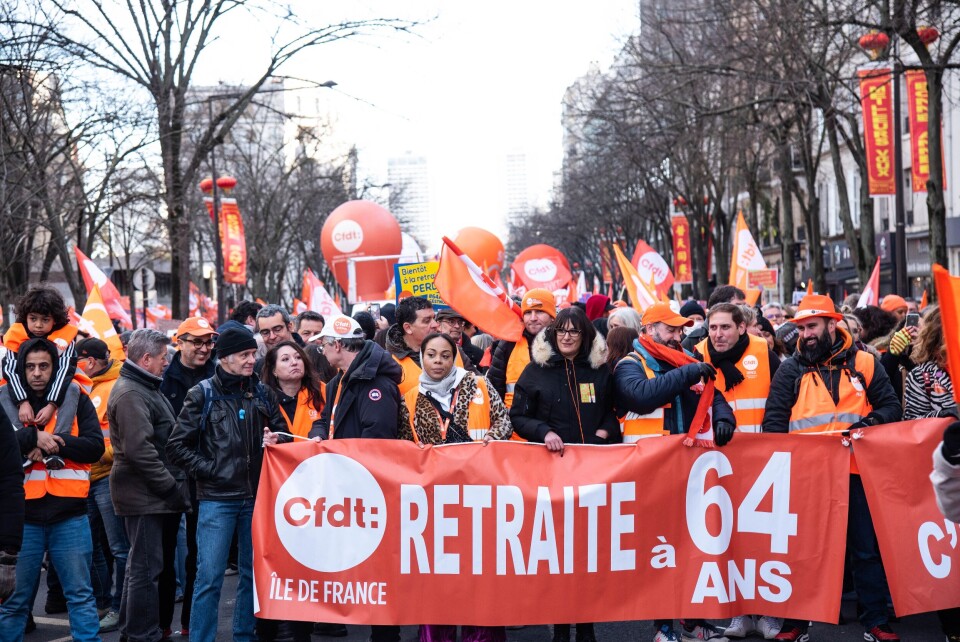-
‘No evidence third party involved’ in deaths of British couple in south-west France
Investigators update The Connexion on Dawn Kerr and Andrew Searle case
-
MPs push to remove low emission zones in France
Critics say the zones penalise lower-income households, but the government has warned abolishing them could cost billions
-
Trump tariffs: Americans in France hit by dollar drop
Europe has said the tariffs will cause the economy to ‘massively suffer’ as France plans retaliation
Reignite or fizzle out? What next for France’s pension reform strikes?
France’s controversial pension reforms were broadly approved on Friday and are set to come into effect on September 1

France’s president, Emmanuel Macron, wasted little time in getting his government’s controversial pension reforms onto the statute books.
Just hours after France’s highest constitutional authority, Le Conseil constitutionnel, broadly approved the changes - which will see the minimum retirement age raised from 62 to 64 - on Friday (April 14), Mr Macron promulgated the law. It means the changes are set to come into effect on September 1.
Read more: Updated: Dates and sectors of upcoming pension strikes in France
Read more: France's pension reforms largely approved as referendum rejected
The move came as a major blow to the majority of French people who oppose the reforms and the hundreds of thousands who have been demonstrating over recent months.
So, what will Mr Macron’s move mean for the protests and strikes? Will they be reignited or slowly fizzle out?
Will May 1 help boost the protest movement?
In the aftermath of the Conseil constitutionnel’s decision, French unions called for more industrial action.
There is expected to be disruption on the railways on Thursday (April 20) after four key railway unions - CFDT, CGT, Sud-Rail and UNSA - called for strikes. The CGT has also called for a walkout next Friday (April 28).
But the big one is on May 1. This date is an annual bank holiday in France and called la fête du Travail. It sees workers - and progress in protecting their rights - celebrated with marches and protests. This year it is expected to be used to mobilise opposition to the pension reforms.
“People will turn up in the streets since it is a bank holiday and a symbolic date for unions,” Bruno Cautrès, a research fellow at Sciences Po’s political research centre CEVIPOF, told The Connexion.
May 1 comes at a good time for unions. Turnout has declined steadily in recent weeks. The last national day of strikes last Thursday (April 13) saw 380,000 on the streets, according to figures from France’s interior ministry. Unions dispute this, saying there were one million protesters.
According to the interior ministry, there were 1.28 million protesting on March 7. Unions said there were 3.5 million protesters.
“Will it [a big turnout] be a May 1-effect or down to protesters being mobilised [by Mr Macron’s promulgation of the law]? It is too early to call,” said Mr Cautrès.
‘If it refuses, there will be a lot of anger and rage’
Another key date that could dictate whether protests are reignited comes two days later on Wednesday, May 3.
This is when France’s Conseil constitutionnel will rule on a second request to hold a referendum on the pension reforms.
It rejected the first one in its judgement last Friday.
“The reform is caught between two periods,” Michel Wievorka, a sociologist and expert on social movements, told The Connexion.
“If the Conseil constitutionnel allows the [second] referendum, It will open the country to a myriad of initiatives from the opposition to guarantee its [the referendum’s] success,” said Mr Wievorka.
“If it refuses, there will be a lot of anger and rage,” he added, predicting more violent actions within demonstrations.
Macron’s speech to the nation
On Monday (April 17), Mr Macron made a televised speech to the nation in an apparent attempt to turn the page on a controversial chapter.
He acknowledged the reforms had not been accepted by a majority of French people.
Mr Macron also tried to move the debate on by pledging to work towards improving France’s hospitals and law and order.
But his speech appeared to do little to calm his critics.
Alexis Corbière, from the far-left La France Insoumise party, said the speech was ‘another exercise of political arrogance”.
“The speech does not mean French people will move on,” said Mr Cautres, adding that “a strong feeling of injustice remains up in the air”.
“I exclude any rapid and satisfying cooling down of the situation,” added Mr Wievorka. “Nothing important will happen before May.”
Related articles
Five key takeaways from Macron’s televised speech to the nation
Pension protests in France: how did it get to this and what is next?
King Charles III’s state visit postponed amid France pensions unrest
























